Fleurs du Mal Magazine


Or see the index
A moving collection of autobiographical essays from a Russian poet and refugee of the Bolshevik Revolution.
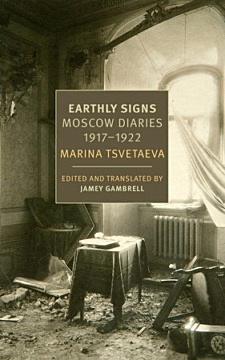 Marina Tsvetaeva ranks with Anna Akhmatova, Osip Mandelstam, and Boris Pasternak as one of Russia’s greatest twentieth-century poets. Her suicide at the age of forty-eight was the tragic culmination of a life buffeted by political upheaval.
Marina Tsvetaeva ranks with Anna Akhmatova, Osip Mandelstam, and Boris Pasternak as one of Russia’s greatest twentieth-century poets. Her suicide at the age of forty-eight was the tragic culmination of a life buffeted by political upheaval.
The essays collected in this volume are based on diaries she kept during the turbulent years of the Revolution and Civil War.
In them she records conversations of women in the markets, soldiers and peasants on the train traveling from the Crimea to Moscow in October 1917, fighting in the streets of Moscow, a frantic scramble with co-workers to dig frozen potatoes out of a cellar, and poetry readings organized by a newly minted Soviet bohemia.
Alone in Moscow with two small children, no income, and a missing husband, Tsvetaeva struggled to feed her daughters (one of whom died of malnutrition in an orphanage), find employment in the Soviet bureaucracy, and keep writing poetry. Her keen and ruthless eye observes with compassion and humor—bringing the social, economic, and cultural chaos of the period to life. These autobiographical writings not only give a vivid eyewitness account of Russian history but provide vital insights into the workings of Tsvetaeva’s unique poetics.
Includes black and white photographs.
Earthly Signs
Moscow Diaries, 1917-1922
By Marina Tsvetaeva
Translated by Jamey Gambrell
Poetry
Paperback
Dec 05, 2017
288 Pages
Paperback
$17.95
Published by NYRB Classics
ISBN 9781681371627
new books
fleursdumal.nl magazine
More in: - Book News, Achmatova, Anna, Archive S-T, Archive S-T, Art & Literature News, Mandelstam, Osip, Pasternak, Boris, REPRESSION OF WRITERS, JOURNALISTS & ARTISTS, Tsvetaeva, Marina

The Outlaw of Loch Lene, from the Irish
O Many a day have I made good ale in the glen,
That came not of stream or malt, like the brewing of men:
My bed was the ground; my roof, the green-wood above;
And the wealth that I sought, one far kind glance from my Love.
Alas! on that night when the horses I drove from the field,
That I was not near from terror my angel to shield!
She stretch’d forth her arms; her mantle she flung to the wind,
And swam o’er Loch Lene, her outlaw’d lover to find.
O would that a freezing sleet-wing’d tempest did sweep,
And I and my love were alone, far off on the deep;
I’d ask not a ship, or a bark, or a pinnace, to save–
With her hand round my waist, I’d fear not the wind or the wave.
‘Tis down by the lake where the wild tree fringes its sides,
The maid of my heart, my fair one of Heaven resides:
I think, as at eve she wanders its mazes among,
The birds go to sleep by the sweet wild twist of her song.
Jeremiah Joseph Callanan
(1795-1839)
The Outlaw of Loch Lene, from the Irish
fleursdumal.nl magazine
More in: Archive C-D, Archive C-D, CLASSIC POETRY
Bullets into Bells is a powerful call to end American gun violence from celebrated poets and those most impacted
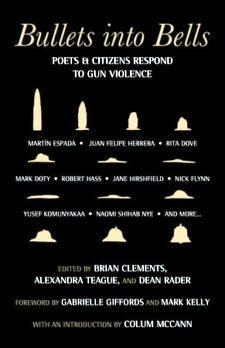 Focused intensively on the crisis of gun violence in America, this volume brings together poems by dozens of our best-known poets, including Billy Collins, Patricia Smith, Natalie Diaz, Ocean Vuong, Danez Smith, Brenda Hillman, Natasha Threthewey, Robert Hass, Naomi Shihab Nye, Juan Felipe Herrera, Mark Doty, Rita Dove, and Yusef Komunyakaa.
Focused intensively on the crisis of gun violence in America, this volume brings together poems by dozens of our best-known poets, including Billy Collins, Patricia Smith, Natalie Diaz, Ocean Vuong, Danez Smith, Brenda Hillman, Natasha Threthewey, Robert Hass, Naomi Shihab Nye, Juan Felipe Herrera, Mark Doty, Rita Dove, and Yusef Komunyakaa.
Each poem is followed by a response from a gun violence prevention activist, political figure, survivor, or concerned individual, including Nobel Peace Prize laureate Jody Williams; Senator Christopher Murphy; Moms Demand Action founder Shannon Watts; survivors of the Columbine, Sandy Hook, Charleston Emmanuel AME, and Virginia Tech shootings; and Samaria Rice, mother of Tamir, and Lucy McBath, mother of Jordan Davis.
The result is a stunning collection of poems and prose that speaks directly to the heart and a persuasive and moving testament to the urgent need for gun control.
Bullets into Bells
Poets & Citizens Respond to Gun Violence
Foreword by Gabrielle Giffords
Introduction by Colum McCann
Edited by Brian Clements, Alexandra Teague and Dean Rader
Category: Poetry
Paperback
Dec 05, 2017
208 Pages
$15.00
Published by Beacon Press
ISBN 9780807025581
new books
fleursdumal.nl magazine
More in: - Book News, - Book Stories, Art & Literature News, CRIME & PUNISHMENT, MUSEUM OF PUBLIC PROTEST, Ocean Vuong, POETRY ARCHIVE
Wüsste man nichts von Jan Wagners lyrischem Werk, man würde überhaupt nur noch Essays von ihm lesen wollen.
 Ob er über Bibliotheken, Buchhandlungen, Lyrik oder Kunst schreibt, ob er literarische Postkarten aus Rom oder Los Angeles sendet oder die Epiphanie eines Rosmarins im schwäbischen Garten feiert – man glaubt diesem charmanten Geschichtenerzähler alles.
Ob er über Bibliotheken, Buchhandlungen, Lyrik oder Kunst schreibt, ob er literarische Postkarten aus Rom oder Los Angeles sendet oder die Epiphanie eines Rosmarins im schwäbischen Garten feiert – man glaubt diesem charmanten Geschichtenerzähler alles.
Es bleibt kaum Zeit, die rhetorische Fingerfertigkeit zu bewundern, mit der da zwischen souveräner Gelehrsamkeit unerwartet die nächste Anekdote aus dem Ärmel gezogen wird, und man kann nicht anders als staunen über die Trouvaillen, die Jan Wagner von seinen Entdeckungsreisen quer durch Epochen und Kontinente mitbringt.
Jan Wagner, 1971 in Hamburg geboren, lebt in Berlin. 2001 erschien sein erster Gedichtband Probebohrung im Himmel. Es folgten Guerickes Sperling (2004), Achtzehn Pasteten (2007), Australien (2010), Die Eulenhasser in den Hallenhäusern (2012) und zuletzt der Sammelband Selbstporträt mit Bienenschwarm (2016). Zudem ist er Mitherausgeber der Minnesang-Anthologie Unmögliche Liebe (Die Kunst des Minnesangs in neuen Übertragungen, 2017). Für seine Lyrik wurde Jan Wagner vielfach ausgezeichnet. Mit seinem Gedichtband Regentonnenvariationen (2014) gewann er 2015 den Preis der Leipziger Buchmesse, außerdem wurde er 2017 mit dem Georg-Büchner-Preis ausgezeichnet.
Jan Wagner:
Der verschlossene Raum.
Beiläufige Prosa
EAN: 9783446254756
ISBN: 3446254757
Libri: 2557154
Hanser Berlin
2017 – 268 Seiten
gebunden € 22,00
new books
fleursdumal.nl magazine
More in: - Book News, - Book Stories, Archive W-X, Archive W-X, Art & Literature News
Dès l’origine l’écriture de Fabienne Courtade tend au plus extrême dépouillement, par le biais d’une méditation qui n’oublie jamais le monde extérieur, ni le travail matériel propre à la poésie contemporaine.
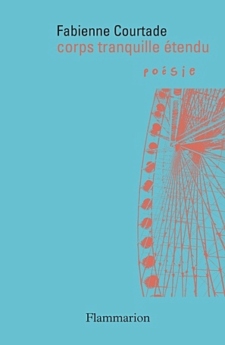 Dans ce nouveau chant contrarié – tourné plutôt vers une impossible lumière – la narration s’est encore resserrée, le lexique et l’anecdote se voient ramenés à l’essentiel. Une femme marche dans la ville et se parle à elle-même ou s’adresse à une ombre, évoquant des instants enfuis, une présence obsédante, des paysages estompés.
Dans ce nouveau chant contrarié – tourné plutôt vers une impossible lumière – la narration s’est encore resserrée, le lexique et l’anecdote se voient ramenés à l’essentiel. Une femme marche dans la ville et se parle à elle-même ou s’adresse à une ombre, évoquant des instants enfuis, une présence obsédante, des paysages estompés.
Aucune nostalgie néanmoins ni mélancolie dans ces pages : il s’agit au contraire de capter dans le déroulement des gestes, des trajets, des décors les plus ordinaires, une grâce moins apparente que le temps décidément n’abolit pas. Et que le poème parvient à fixer avec ses outils de langage, dans l’évidence et le mystère qui lui sont propres.
Depuis Nous, infiniment risqués (1987) Fabienne Courtade est l’auteur d’une quinzaine d’ouvrages, au carrefour du poème et du récit. Corps tranquille étendu est le quatrième titre qu’elle publie dans la collection Poésie/Flammarion.
Fabienne Courtade
‘corps tranquille étendu’
Poésie/Flammarion
Paru le 15/11/2017
Genre : Théâtre
224 pages
Grand format 129 x 199 cm
Broché
EAN : 9782081415508
ISBN : 9782081415508
€ 17.00
new books
fleursdumal.nl magazine
More in: - Book News, - Book Stories, Archive C-D, Archive C-D, Art & Literature News, THEATRE

To-Day
Voice, with what emulous fire thou singest free hearts of old fashion,
English scorners of Spain, sweeping the blue sea-way,
Sing me the daring of life for life, the magnanimous passion
Of man for man in the mean populous streets of To-day!
Hand, with what color and power thou couldst show, in the ring hot-sanded,
Brown Bestiarius holding the lean tawn tiger at bay,
Paint me the wrestle of Toil with the wild-beast Want, bare-handed;
Shadow me forth a soul steadily facing To-day!
Helen Gray Cone
(1859-1934)
To-Day
fleursdumal.nl magazine
More in: Archive C-D, Archive C-D, CLASSIC POETRY
“The experiences could be understood only as being of such extremity that they stood beyond written words; it was not a failure of language, but a view that, for the individual, language, particularly written words, and the enormity of the experience were not matched.”
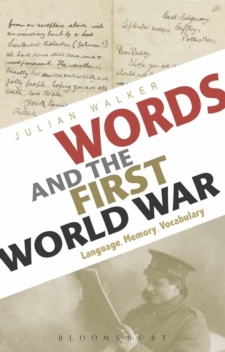 First World War expert Julian Walker looks at how the conflict shaped English and its relationship with other languages. He considers language in relation to mediation and authenticity, as well as the limitations and potential of different kinds of verbal communication.
First World War expert Julian Walker looks at how the conflict shaped English and its relationship with other languages. He considers language in relation to mediation and authenticity, as well as the limitations and potential of different kinds of verbal communication.
Walker also examines:
– How language changed, and why changed language was used in communications
– Language used at the Front and how the ‘language of the war’ was commercially exploited on the Home Front
– The relationship between language, soldiers and class
– The idea of the ‘indescribability’ of the war and the linguistic codes used to convey the experience
‘Languages of the front’ became linguistic souvenirs of the war, abandoned by soldiers but taken up by academics, memoir writers and commentators, leaving an indelible mark on the words we use even today.
Julian Walker is a writer, researcher, artist and educator. He is an Honorary Research Associate at University College, London, UK. He is the co-author of Languages and the First World War: Communicating in a Transnational War (2016), the author of The Roar of the Crowd (2016) and Trench Talk (2012) among many others. His website is www.julianwalker.net
Writes: Lexicology, First World War, Sociolinguistics and Linguistic Anthropology, World History, Heritage
Author of : Words and the First World War, Team Talk, Discovering Words in the Kitchen, Discovering Words
“This is a substantial book, dense but always accessible, covering both time and space. Gratifyingly, it sidesteps an all too common error that entraps books on words, of becoming no more than a padded dictionary.” – The Daily Telegraph
Words and the First World War
Language, Memory, Vocabulary
By: Julian Walker
Published: 28-12-2017
Format: Paperback
Edition: 1st
Extent: 416
ISBN: 9781350001923
Imprint: Bloomsbury Academic
Illustrations: 50 bw images
Dimensions: 216 x 138 mm
Prize: £14.99
fleursdumal.nl magazine
More in: *War Poetry Archive, - Book News, - Book Stories, Archive W-X, Art & Literature News, Histoire de France, Historia Belgica, History of Britain
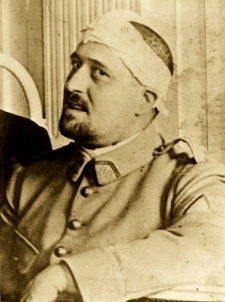
C’est l’hiver
C’est l’hiver et déjà j’ai revu des bourgeons
Aux figuiers dans les clos Mon amour nous bougeons
Vers la paix ce printemps de la guerre où nous sommes
Nous sommes bien Là-bas entends le cri des hommes
Un marin japonais se gratte l’œil gauche avec l’orteil droit
Sur le chemin de l’exil voici des fils de rois
Mon cœur tourne autour de toi comme un kolo où dansent quelques
jeunes soldats serbes auprès d’une pucelle endormie
Le fantassin blond fait la chasse aux morpions sous la pluie
Un belge interné dans les Pays-Bas lit un journal où il est question de moi
Sur la digue une reine regarde le champ de bataille avec effroi
L’ambulancier ferme les yeux devant l’horrible blessure
Le sonneur voit le beffroi tomber comme une poire trop mûre
Le capitaine anglais dont le vaisseau coule tire une dernière pipe d’opium
Ils crient Cri vers le printemps de paix qui va venir
Entends le cri des hommes
Mais mon cri va vers toi mon Lou tu es ma paix et mon printemps
Tu es ma Lou chérie le bonheur que j’attends
C’est pour notre bonheur que je me prépare à la mort
C’est pour notre bonheur que dans la vie j’espère encore
C’est pour notre bonheur que luttent les armées
Que l’on pointe au miroir sur l’infanterie décimée
Que passent les obus comme des étoiles filantes
Que vont les prisonniers en troupes dolentes
Et que mon cœur ne bat que pour toi ma chérie
Mon amour ô mon Loup mon art et mon artillerie
Guillaume Apollinaire
(1880 – 1918)
Poèmes à Lou
C’est l’hiver
fleursdumal.nl magazine
More in: *Concrete + Visual Poetry A-E, Apollinaire, Guillaume, Archive A-B, Guillaume Apollinaire

A Vagabond Song
There is something in the autumn
that is native to my blood —
Touch of manner, hint of mood;
And my heart is like a rhyme,
With the yellow and the purple
and the crimson keeping time.
The scarlet of the maples
can shake me like a cry
Of bugles going by.
And my lonely spirit thrills
To see the frosty asters
like a smoke upon the hills.
There is something in October
sets the gypsy blood astir;
We must rise and follow her,
When from every hill of flame
She calls and calls
each vagabond by name.
Bliss Carman
(1861-1929)
A Vagabond Song
fleursdumal.nl magazine
More in: Archive C-D, Archive C-D, CLASSIC POETRY
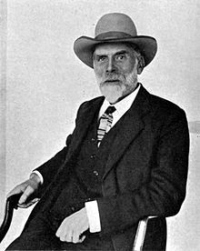
To Thos. Floyd
How fares it, friend, since I by Fate annoy’d
Left the old home in need of livelier play
For body and mind? How fare, this many a day,
The stubborn thews and ageless heart of Floyd?
If not too well with country sport employ’d,
Visit my flock, the breezy hill that they
Choose for their fold; and see, for thence you may,
From rising walls all roofless yet and void,
The lovely city, thronging tower and spire,
The mind of the wide landscape, dreaming deep,
Grey-silvery in the vale; a shrine where keep
Memorian hopes their pale celestial fire:
Like man’s immortal conscience of desire,
The spirit that watcheth in me ev’n in my sleep.
“While yet we wait for spring, and from the dry”
While yet we wait for spring, and from the dry
And blackening east that so embitters March,
Well-housed must watch grey fields and meadows parch,
And driven dust and withering snowflake fly;
Already in glimpses of the tarnish’d sky
The sun is warm and beckons to the larch,
And where the covert hazels interarch
Their tassell’d twigs, fair beds of primrose lie.
Beneath the crisp and wintry carpet hid
A million buds but stay their blossoming;
And trustful birds have built their nests amid
The shuddering boughs, and only wait to sing
Till one soft shower from the south shall bid,
And hither tempt the pilgrim steps of spring.
“In autumn moonlight, when the white air wan”
In autumn moonlight, when the white air wan
Is fragrant in the wake of summer hence,
‘Tis sweet to sit entranced, and muse thereon
In melancholy and godlike indolence:
When the proud spirit, lull’d by mortal prime
To fond pretence of immortality,
Vieweth all moments from the birth of time,
All things whate’er have been or yet shall be.
And like the garden, where the year is spent,
The ruin of old life is full of yearning,
Mingling poetic rapture of lament
With flowers and sunshine of spring’s sure returning;
Only in visions of the white air wan
By godlike fancy seized and dwelt upon.
Robert Bridges
(1844-1930)
To Thos. Floyd
fleursdumal.nl magazine
More in: *War Poetry Archive, Archive A-B, Bridges, Robert

Ypres
She was a city of patience; of proud name,
Dimmed by neglecting Time; of beauty and loss;
Of acquiescence in the creeping moss.
But on a sudden fierce destruction came
Tigerishly pouncing: thunderbolt and flame
Showered on her streets, to shatter them and toss
Her ancient towers to ashes. Riven across,
She rose, dead, into never-dying fame.
White against heavens of storm, a ghost, she is known
To the world’s ends. The myriads of the brave
Sleep round her. Desolately glorified,
She, moon-like, draws her own far-moving tide
Of sorrow and memory; toward her, each alone,
Glide the dark dreams that seek an English grave.
Laurence Binyon
(1869 – 1943)
Ypres
fleursdumal.nl magazine
More in: *War Poetry Archive, Archive A-B, WAR & PEACE
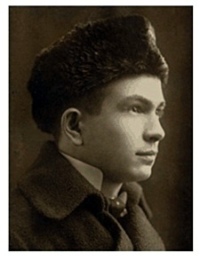
Guido Gezelle
Plant
fontein
scheut die schiet
straal die spat
tempeest over alle diepten
storm over alle vlakten
wilde rozelaars waaien
stemmen van elzekoningen bloot
Diepste verte
verste diepte
bloemekelk die schokt in de kelk
van bei’ mijn palmen
en lief als de madelief
Als de klaproos rood
o wilde papaver mijn
Paul van Ostaijen
(1896 – 1928)
Guido Gezelle
fleursdumal.nl magazine
More in: *Concrete + Visual Poetry K-O, Gezelle, Guido, Ostaijen, Paul van, Paul van Ostaijen, Paul van Ostaijen
Thank you for reading Fleurs du Mal - magazine for art & literature